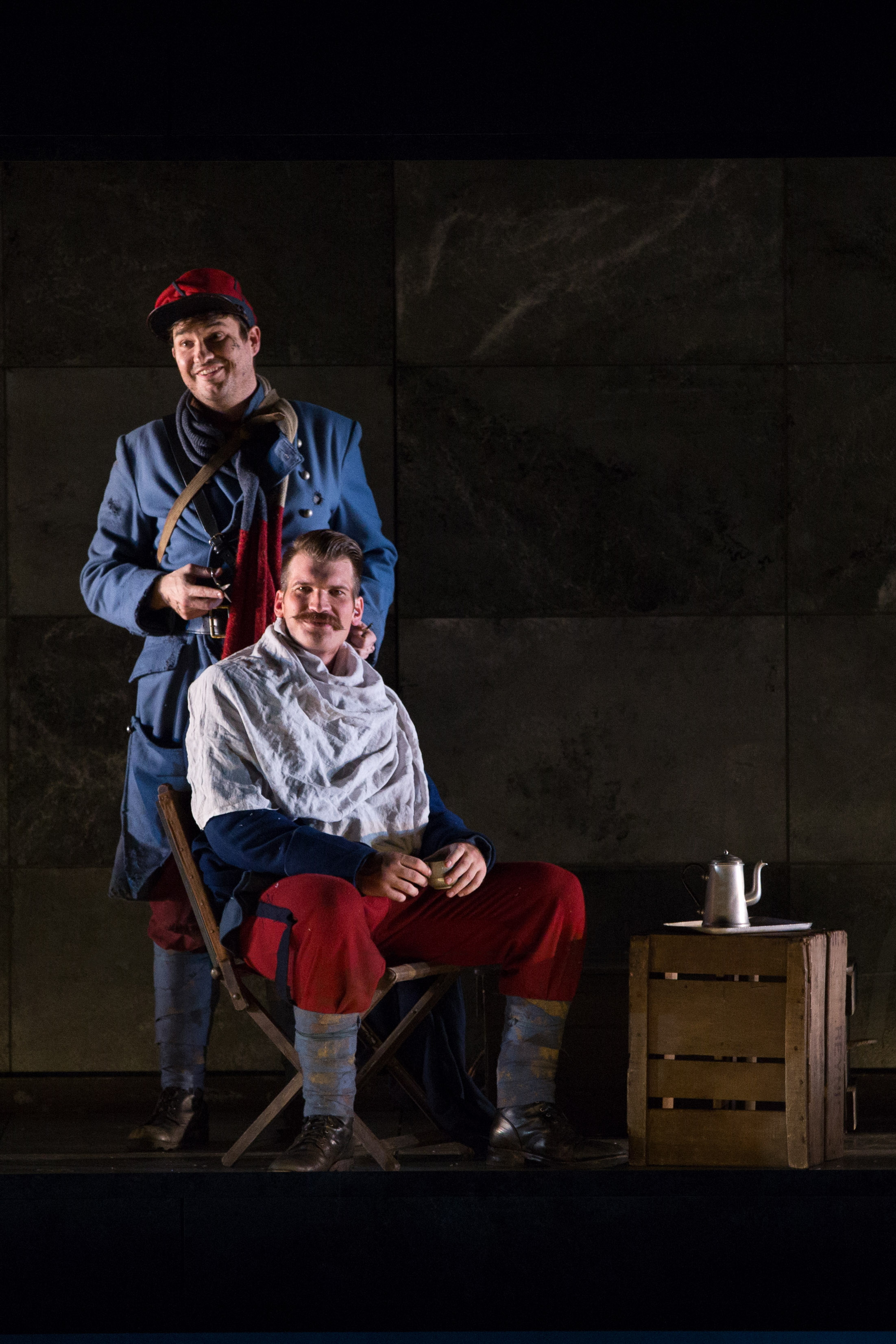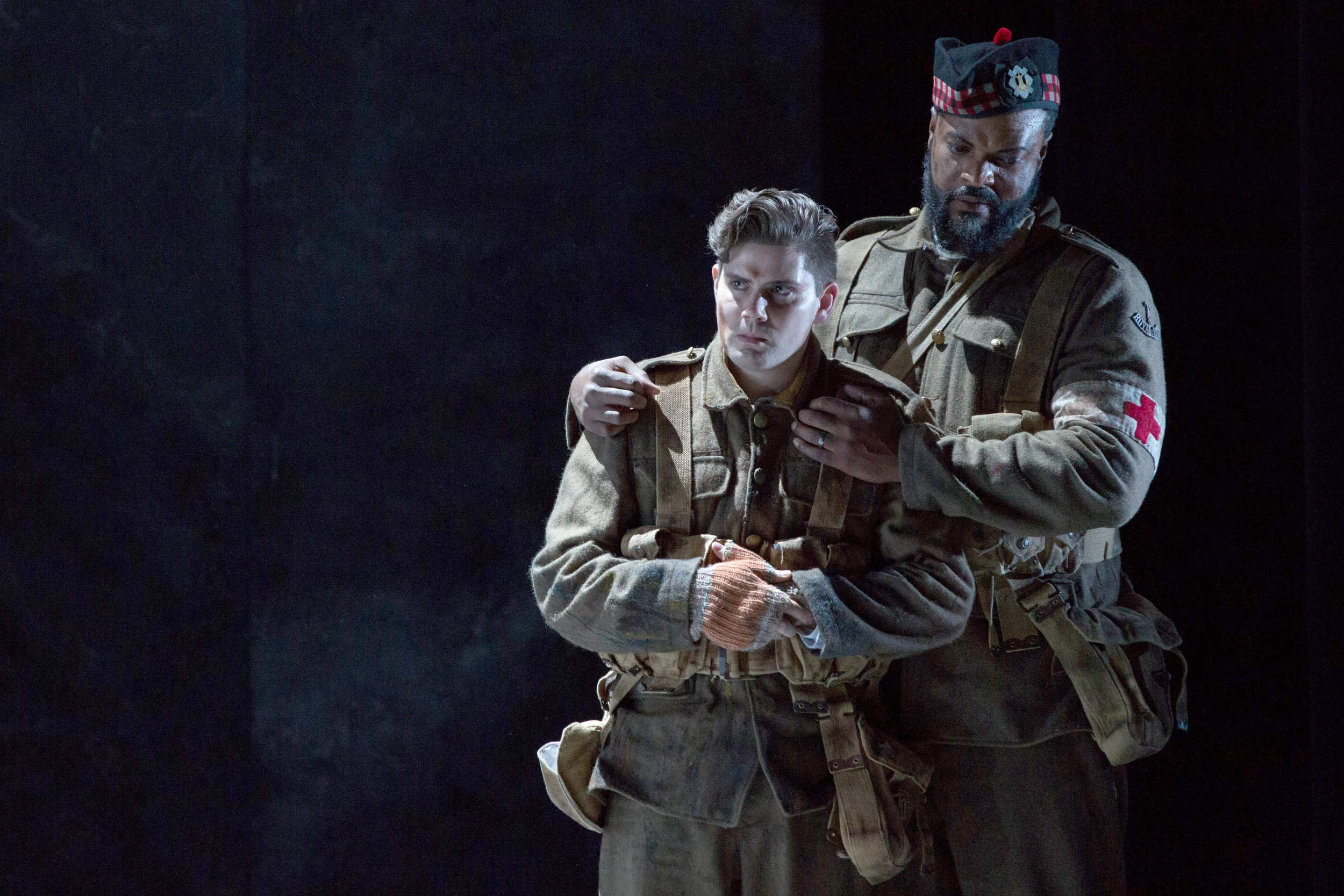I had been waiting for this opera, thirsting for it actually. It is the only one on WNO’s schedule this season that I haven’t seen before, more than once. Even though it has been performed every year since it premiered in 2011 and won the 2012 Pulitzer Prize for music, I was willing to accept that it probably wouldn’t be as great as La Traviata or Tosca just to get to hear something new, something born of our time. I discovered Saturday night that it deserves its popularity. I also discovered that I needed Silent Night for another reason, for the same reason every year I go back to “A Christmas Carol” and “It’s a Wonderful Life”. In our highly divided and polarized time especially, I need to be reminded of the possibility and joy of simple human goodness in all of us, goodness that awaits the opportunity to come out.
The fog of war enshrouds the Scottish troops. Photo by Teresa Wood; courtesy of Washington National Opera.
Based on real events, Silent Night tells the story of a 1914 Christmas Eve ceasefire that emerged between groups of Scottish, French, and German soldiers on the Western Front in World War I. This unofficial pause in hostilities lasted approximately 24 hours, not a truce negotiated by countries or generals but by combatants facing each other. They had been at war for six months in the harsh conditions of trench warfare with high casualties and deaths from both enemy fire and disease. They had expected the war would be brief but starting to grow weary, realizing they would not be returning home soon. They were fighting in a trench line that ran north south the length of Europe; the homes they longed to return to weren’t that far away. The opposing lines were so close that the soldiers on different sides could hear and see glimpses of each other. The deadly area between the trenches was known as “no man’s land”. Before the hostilities ceased in 1918, approximately ten million combatants had died and many more civilians; the casualties were especially high because the strategy and tactics of close encounter warfare had not caught up with the ability of modern weaponry and technology to kill and because of the crowded and unsanitary conditions in the trenches.
This fictional version of real events was first presented in the 2005 movie “Joyeux Noel”. The Minnesota Opera commissioned Kevin Puts to compose the score and Mark Campbell to write the libretto for a new opera adapted from the film. It was Mr. Puts’ first opera and became a Pulitzer Prize winner. Mr. Campbell was already an experienced librettist; he and Mr. Puts have since produced two additional operas together (Elizabeth Cree and The Manchurian Candidate).
Lt. Audebert played by Michael Adams, Lt. Horstmayer played by Alexsey Bogdanov, and Lt. Gordon played by Norman Garrett negotiating the truce. Photo by Teresa Wood; courtesy of Washington National Opera.
Historians still debate the reasons governments and leaders chose to engage in this war and allow it to go on for so long. Silent Night presents personal stories of the men doing the fighting - the Scottish brothers William and Jonathan Dale, with William killed in battle causing Jonathan to vow revenge; two opera singers, Anna Sørensen and Nikolaus Sprink, in love and separated by war attempting to reunite, and French Lieutenant Audebert, longing for his wife and the child born while he is at war. These stories are woven into the narrative of the ceasefire. Told this way, the drama comes to life, and the important themes are revealed. Being so close to the enemy in the opposing trenches caused the men to sense the humanity of their opponents and feel a connection with them and become less willing to shoot each other; the generals and higher level field commanders were outraged when they received reports of the ceasefires. Being close enough to the characters on the stage to see and hear their personal stories pulls you into a connection with them. I found Silent Night to be deeply affecting.
The truce begins for the men in three trenches. Photo by Teresa Wood; courtesy of Washington National Opera.
The opera begins and ends displaying a large World War I monument behind a scrim while the names of those soldiers who died scrolled down the scrim. In between, a clever set shows the three groups of soldiers in their trenches stacked one upon another. That arrangement makes it easy to see group and individual actions and interactions with all in view at once with few scene changes. After the opera begins with a scene in a German opera house where the outbreak of war is announced, we see different characters and groups being recruited to fight the war. The reasons for joining are the same for soldiers on both sides, to protect their families and countries and to do their duty. We see nothing of the political issues that caused their leaders to push them into combat. Soon a horrific battle scene occurs. The action takes place behind a scrim that added mood-enhancing images to the scene (but was also somewhat distracting). The carnage was perhaps tame by modern standards, but I agree with WNO’s decision to warn parents that the opera is best for those 12 years old or older. After the battle subsides, the exhausted and dispirited soldiers need a break. The head officers of each group, French Lt. Audebert, German Lt. Horstmayer, and Scottish Lt. Gordon, bravely carry white flags into no man’s land to meet, agreeing to a brief truce on Christmas Eve with its call for ‘Peace on Earth’. An evening Christmas mass is given, and the soldiers begin to enjoy their differences in culture and see themselves in their presumed enemies.
The opera singers, Anna Sørensen played by Raquel González and Nikolaus Spinks played by Alexander McKissick. Photo by Teresa Wood; courtesy of Washington National Opera.
Silent Night is presented in the Eisenhower Theater rather than the much larger Opera House (2364 seats versus 1164). The reason given is that the smaller venue allows for a more intimate and effective presentation. I suspect WNO artistic director Francesca Zambello also believed sales for a contemporary opera would be less, though in fact Silent Night is almost a sell out for all seven performances. She also chose to use current and recent graduates of the Domingo-Cafritz Young Artist Program for the large cast required without bringing in more prominent and seasoned singers. If that is the deal for getting more new opera into the Kennedy Center, I’ll take that deal any day, and obviously so will a lot of other opera fans. These talented young artists are remarkably good at acting and singing, and as a group were quite believable, conveying the emotional intensity of this story very well. Kudos to Washington National Opera for bringing us a quality contemporary opera.
left: Jonathan Dale played by Arnold Livingston Geis is consoled by Father Palmer played by Kenneth Kellogg. right: Ponchel played by Christian Bowers trims the hair of Lt. Audebert played by Michael Adams. Photos by Teresa Wood; courtesy of Washington National Opera.
I will single out a handful of singers for special mention, but I am grateful to them all for telling this story so well. The young lovers and opera singers, Anna and Nikolaus, were played by soprano Raquel Gonzalez and tenor Alexander McKissick. Ms. Gonzalez is a beautiful fit for the role; her voice is especially luminous in singing for the mass. I have enjoyed Mr. McKissick’s singing in several productions around town and he performed admirably as a soldier torn between love and duty. Baritone Michael Adams as Audebert, baritone Norman Garrett as Gordon, and baritone Aleksey Bogdanov as Horstmayer gave strong, touching performances as leaders torn between their call to duty and their sense of humanity. Other noteworthy performances were given by tenor Arnold Livingston Geis as Jonathan Dale, bass Kenneth Kellogg as Father Palmer, and baritone Christian Bowers who portrayed Audebert’s aide de camp Ponchel.
The director for this production is Tomer Zvulun, General and Artistic Director of the Atlanta Opera. He has a special attachment to this opera because of his military background and his familiarity with the chaos of battle; he has directed Silent Night previously, including the original production by the Wexford Festival Opera. Kudos to him for effective story telling. The conductor is Nicole Paiement who also conducted the recent WNO performance of Candide and who has a specialty in conducting new opera. One unique aspect of this production was the program statement that this production used a reorchestration by Jacques Desjardins. The conductor’s program notes explains that this orchestration involved using combinations of instruments to effectively replace a different instrument, allowing the orchestra to be downsized for smaller venues. Composer Puts was consulted along the way and the final score was approved by him. I enjoyed the music and the supporting male chorus, which changed in style to reflect the different nationalities, languages, and scenes being presented, and was all original; no traditional Christmas music is employed, but it does feature a bagpipe for the Scots.
Scottish Father Palmer played by Kenneth Kellogg conducts mass for all the soldiers. Photo by Teresa Wood; courtesy of Washington National Opera.
Silent NIght is about serious stuff, but not just about the horror of war. The drama on display reminds us that we are all human beings and that we and our enemies cherish the same things, our livelihoods, our families, and our honor. Challenging us to remember that will perhaps make us less likely to harm our fellow man. Perhaps the far too subliminal message to be gained from this opera is the flip-side of its theme - when men on battlefields become merely distant targets that can be hit with drones and modern long-range weaponry, the killing becomes easier and more acceptable. Silent Night brings us these important Christmas messages and just may take its place alongside other Christmas classics that we know and love.
Silent Night is an opera and should be judged on its merit as a work of art. I enjoyed the evening and was affected by the work. It’s a good opera with a message to be embraced wholeheartedly and well worth seeing. It was heartening to see the representatives of countries who participated in the war coming to the stage in the curtain call in memoriam to the men and women who fought in WWI and as an affirmation of this story of Peace.
The Fan Experience: There are six more performances of Silent Night on November 14, 17, 18, 20, 23, and 25. Only a limited number of seats remain. I thought the Eisenhower Theater was fine for this production. Colin Brush gave a rapid-fire, but highly detailed and informative pre-opera talk starting one hour before the performance - recommended. Free opera Talk Backs with selected artists take place immediately after the performance. This may be one opera where the closer you sit, the more involved in the drama you may feel and the more empathy for the characters you may develop, if I’ve learned my lesson right. I now wish to see the movie, “Joyeux Noel”; it is available for streaming on Amazon.







